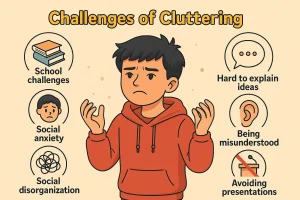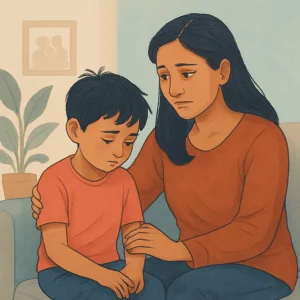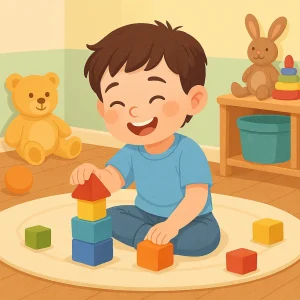How Can Siblings Support a Child With Apraxia?
By Wellness Hub
Last Updated: April 15, 2025
When a child is diagnosed with childhood apraxia of speech (CAS)—a motor speech disorder that affects how they plan and produce words—it doesn’t just impact them. It touches the whole family, especially siblings. Many parents wonder how to help their other children understand apraxia and support their brother or sister’s speech journey.
The good news? Siblings can play a powerful role in building communication skills, confidence, and emotional connection—right at home.
In this guide, you’ll learn simple, play-based strategies to involve siblings in your child’s speech development journey. Discover how your family can grow stronger, one word at a time.
What is Childhood Apraxia of Speech (CAS)?
If your child has been diagnosed with childhood apraxia of speech (CAS), you’re not alone—and it’s okay to feel overwhelmed at first. CAS is a motor speech disorder, which simply means that the brain has trouble planning and coordinating the muscle movements needed for speech. It’s not about the child being unwilling to speak—it’s about their brain having difficulty sending the right signals to their mouth.
Children with apraxia know what they want to say, but their speech may come out unclear, slow, or broken. Some children may struggle to imitate words, even though they understand language well. Others may say the same word differently each time they try.
Signs of Childhood Apraxia of Speech
- Limited babbling as a baby
- Trouble combining sounds correctly
- Inconsistent speech errors
- Speech that is hard to understand
- Difficulty imitating sounds or words
- Groping movements with the mouth
How Apraxia Affects Communication
Apraxia impacts more than just speaking—it can affect how children interact, express emotions, and connect with others. A child with CAS might:
- Avoid talking out of fear of getting it “wrong”
- Feel frustrated when not understood
- Use gestures or facial expressions instead of words
- Speak less, even when they understand more than they show
This can affect their confidence and lead to social withdrawal, especially when around other kids who speak clearly. That’s where siblings come in—they’re often the first communication partners a child has at home.
Siblings who understand the challenges of apraxia can create a safe, encouraging environment that helps their brother or sister practice speaking naturally—through play, shared routines, or just being there without pressure.
Why Family Understanding is Essential
When the whole family understands what apraxia is, the child feels more accepted and less alone. Every child thrives in an environment where they feel seen and heard—even when they can’t express themselves fully yet.
Here’s how families can make a big impact:
- Talk about apraxia openly with all children in the home
- Celebrate small wins in speech progress
- Encourage siblings to be patient and model words gently
- Use routines like reading, singing, or play to build language naturally
- Avoid correcting constantly—support instead of pressure
Read More: Understanding Apraxia of Speech – Types, Symptoms and Support
Why Sibling Support Matters for Kids With Apraxia
The Role of Siblings in Speech Development
When it comes to childhood apraxia of speech, siblings can play a powerful and natural role in helping a child develop their communication skills. Kids learn best from people they trust, and often, a brother or sister is their first and most consistent playmate.
Siblings become everyday speech partners—whether during playtime, storytelling, or just chatting about their favorite cartoons. These small, regular moments provide real-life practice opportunities that feel less like therapy and more like fun.
Here’s how siblings can support speech development at home:
| Sibling Support Strategy | Why It Helps |
|---|---|
| Modeling clear speech | Children with apraxia often copy what they hear. |
| Turn-taking games | Encourages waiting, listening, and verbal responses. |
| Reading aloud together | Builds vocabulary and strengthens word recall. |
| Singing simple songs | Improves rhythm, memory, and articulation. |
| Repetition of familiar phrases | Reinforces sound patterns in a fun, casual way. |
Emotional Support Through Bonding and Patience
Speech challenges can sometimes make a child feel left out, especially when they struggle to keep up with conversations or express their feelings. That’s where emotional support from siblings becomes so important.
Siblings who are taught to be patient, understanding, and inclusive can make a big difference in how their brother or sister feels—both about speech and about themselves.
Here are a few emotional benefits of sibling support:
- Increased self-confidence for the child with apraxia
- Stronger sibling bond through shared experiences
- Less frustration and fewer meltdowns during communication struggles
- More emotional safety, knowing their sibling “gets it”
To nurture this, families can:
- Talk openly about apraxia in age-appropriate ways
- Praise both children for showing kindness and patience
- Encourage playtime that doesn’t rely only on speaking
- Offer attention to all children to avoid feelings of favoritism
Learn More: 12 Must-Know Insights on Childhood Apraxia of Speech
How to Teach Siblings About Apraxia in Simple Words
Age-Appropriate Explanations for Siblings
When one child in the family has childhood apraxia of speech, it’s important that their siblings understand what’s going on. But how you explain it depends a lot on their age. Children, especially younger ones, need simple, honest, and gentle explanations that make sense to them.
Here’s a quick guide to help you talk about apraxia based on your child’s age:
| Sibling Age | How to Explain Apraxia Simply |
|---|---|
| Toddlers (2–4) | “Your brother is learning to talk, and it’s a little harder for him. Let’s be kind and patient.” |
| Young kids (5–7) | “He knows what he wants to say, but his mouth and brain need extra practice to say the words.” |
| Older kids (8–12) | “Apraxia means your sister’s brain has trouble sending the right signals to her mouth to speak.” |
| Teens | “It’s a motor speech disorder. She understands language, but needs more time and practice to speak clearly.” |
Using Books and Visuals to Educate Siblings
Sometimes, kids understand things better when they see it, hear it, or experience it visually. That’s where books, short videos, and visuals can help explain apraxia of speech in a way that’s easy and engaging.
Here are a few resources and tools you can use:
| Tool/Resource | Why It Works |
|---|---|
| Children’s books about apraxia | Use stories with characters who speak differently or face similar challenges. |
| Picture flashcards | Great for toddlers to understand simple word practice and how speech works. |
| Short educational videos | Watch as a family—some videos show kids with apraxia in real life, making it relatable. |
| Drawing or role-play | Let siblings act out or draw how they feel when they struggle to speak or wait to be heard. |
Read More: 9 Myths of Childhood Apraxia of Speech
Everyday Activities That Help Siblings Bond and Support
Fun Games to Encourage Communication
Siblings can become the most natural and playful speech partners a child with childhood apraxia of speech could ever ask for. The key is to include fun, low-pressure games that spark connection, creativity, and of course—communication. These games don’t need to be complicated or educational in a traditional sense. In fact, the simpler and sillier, the better.
Here are some easy and effective games to try at home:
- “Simon Says” – This game is perfect for practicing action words and following instructions. Let siblings take turns leading, so the child with apraxia gets to observe and imitate naturally.
- “I Spy” with categories – Instead of just colors, use categories like “I spy something that makes noise” or “that starts with the ‘b’ sound.” This makes it both fun and phonetic.
- Animal charades – Acting out animals and their sounds is a fantastic way to work on expressive language and sound patterns.
- Sound treasure hunt – Hide objects around the house and let siblings give clues using simple target sounds your child is working on in speech therapy.
What Challenges Can Siblings Face and How to Address Them
While siblings can be a powerful source of support for a child with childhood apraxia of speech, it’s important to recognize that they face their own challenges too. These challenges may not always be visible, but they can affect family dynamics, emotional well-being, and even sibling relationships if left unaddressed.
Common Challenges Siblings May Face
- Feeling Left Out: When more attention goes to the child with apraxia, siblings may feel invisible or less important.
- Confusion or Misunderstanding: Younger siblings might not understand why their brother or sister doesn’t talk clearly or why they get “special” treatment.
- Frustration or Jealousy: Sharing time, toys, or parents’ attention can be hard—especially if one child needs more hands-on care.
- Pressure to be “the good one”: Older siblings may feel like they have to behave perfectly or take on a helper role, which can be emotionally exhausting.
Learn More: Speech Therapy for Developmental Apraxia: How It Can Help Your Child
How Parents Can Support Siblings Effectively
Here are a few ways to help siblings feel seen, heard, and supported:
- Create one-on-one time with each child, even if it’s just 15 minutes a day.
- Talk openly about apraxia in a way that’s honest but simple. Let them ask questions.
- Praise their efforts when they show kindness, patience, or helpfulness.
- Avoid comparing siblings, even casually.
- Teach empathy, not pressure. Siblings can support—but they shouldn’t feel responsible for speech progress.
How Parents Can Support Siblings Effectively
- Schedule “just us” time with each sibling.
Why it helps: Rebuilds connection and shows the sibling that they are equally important. - Use feelings charts or storybooks to help siblings express emotions.
Why it helps: Makes it easier for them to talk about confusing feelings like jealousy or frustration. - Involve them in small, age-appropriate therapy roles (like holding flashcards or cheering).
Why it helps: Makes them feel included and valued, without overwhelming responsibility. - Celebrate sibling teamwork whenever they play together or help in small ways.
Why it helps: Encourages mutual respect and strengthens family bonding.
Conclusion
Supporting a child with childhood apraxia of speech becomes easier when the whole family is involved—especially siblings. Their love, patience, and everyday play can help improve speech and build confidence. Small moments like reading together, playing simple games, or cheering for each other make a big difference. Parents don’t have to do it alone. At Wellness Hub, we offer easy home therapy tools to guide families and involve siblings in fun, meaningful ways.
Frequently Asked Questions:
1. How can siblings help a child with childhood apraxia of speech at home?
Siblings can help by playing speech games, reading books together, repeating simple words, and being patient during conversations. These daily moments encourage communication naturally.
2. Should siblings be involved in speech therapy sessions?
Yes, involving siblings in home speech therapy sessions can make learning fun and build stronger bonds. They can cheer, take turns, or help with flashcards.
3. What is the best way to explain apraxia to a young sibling?
Use simple words like, “Your brother knows what to say, but saying it is harder for him.” Keep it kind and easy to understand based on the sibling’s age.
4. Can playing games with siblings improve speech in children with apraxia?
Yes! Games like Simon Says, I Spy, or animal sounds are great for speech practice and can help children with apraxia feel confident while talking.
5. Why is sibling support important for children with apraxia?
Sibling support helps the child feel loved and included. It also gives more chances to practice speech in a safe and playful way at home.
6. How do I help my other child feel included during speech therapy time?
Let them help with small tasks like showing cards or being the game leader. Praise their efforts and also spend one-on-one time with them regularly.
7. What are some fun ways for siblings to bond with a child who has apraxia?
Try reading together, drawing, singing songs, or acting out stories. These shared activities help build both language and emotional connection.
8. Do siblings feel left out when one child gets more attention for speech therapy?
Sometimes yes. That’s why it’s important to explain things clearly, listen to their feelings, and make time for them too.
9. Is it okay if my child doesn’t want to help their sibling with apraxia?
Yes, that’s normal. Don’t force it. Encourage support through play, and let your child help in small ways when they’re ready.
10. Where can I find tools to help my kids learn about apraxia together?
You can explore Wellness Hub’s home therapy resources and parent training programs designed to involve the whole family in a simple and fun way.
About the Author:
Shilpa Deshpande
Shilpa Deshpande is a skilled speech-language pathologist with over 14 years of experience. Fluent in Kannada, Telugu, Hindi, and English, she specializes in parent counseling, speech sound disorders, fluency assessment, and speech-language evaluations. Shilpa excels at working with children with developmental disorders, offering creative and effective therapy programs. Currently, at Wellness Hub, she holds a BASLP degree and is registered with the RCI. Her patience, ambition, and dedication make her a trusted expert in her field.
Book your Free Consultation Today
Parent/Caregiver Info:
Client’s Details:
* Error Message









